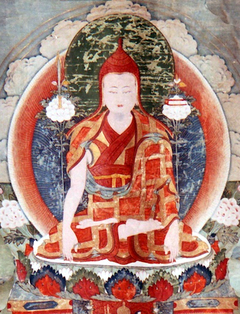Instructions for the Bardos
English | Deutsch | Français | Português | Italiano | བོད་ཡིག
Crucial Advice
A Complete Set of Instructions for the Bardos
by Longchen Rabjam
At the feet of the sacred master, respectfully I pay homage!
Although you have gained this life of freedom and advantage, it will not last,
So keep in mind these instructions for the moment of death.
Now, during this intermediate period of the bardo of this life,
Decide, with complete certainty, that the wisdom of your own awareness is dharmakāya,
And sustaining the ongoing experience of its self-radiance, the meditation which is naturally clear,
Everything will only enhance naturally arising wisdom!
During the bardo of dying, when the four elements dissolve,
There will be the illusory experiences of rising and falling, shaking, and haziness.[1]
And the dissolution of earth, water, fire, wind and space.
The sense faculties too will cease to function. At that time, remind yourself:
“Now I am dying, but there is no need to fear.”
Examine: “What is death? Who is dying? Where does dying take place?”
Death is merely the return of borrowed elements.
In the face of rigpa itself, there is no birth or death.
Within the very form[2] of the dharmakāya of primordial purity, the union of rigpa and emptiness,
Examine: “What is death? Who is dying? Where does dying take place?”
As dying exists nowhere, it is absolutely unreal.
In the experience of this, generate courage and confidence.
The arising of rigpa is not obstructed in any way.
Earth, water, fire, wind and consciousness dissolve into space.
When space dissolves into pure luminosity,
The six consciousnesses dissolve into the basis of all, the dharmadhātu,
As awareness parts from the inanimate, there is an experience of pure awareness, devoid of phenomena.
Separated from the ordinary mind, the great primordial purity of dharmakāya dawns.
Through having recognized this here and now in training,
You will be freed directly, in a single instant.
And gain the dharmakāya of twofold purity.
This is how it dawns, but should you fail to recognize it,
Thereafter, clear light appearances—manifestations of the ground—will arise.
Sounds, lights and colours, peaceful and wrathful ones filling the sky,
By recognizing all these appearances as rigpa's self-radiance,
You will be freed in the original state, and attain awakening.
It is crucial, therefore, to recognize everything as intrinsic radiance.
Through recognizing the essence, you will gain enlightenment.
This is how it all arises, but should you fail to recognize it,
The dream-like bardo of becoming will dawn.
At that time, by recalling a pure land,
And taking refuge in the lama and the yidam deity,
Some will find freedom in a pure buddha paradise,
And some will gain the seven qualities of birth in a higher realm,
And be assured of gaining liberation in the next life.
Therefore, this most profound essence of instructions,
Which is like placing buddhahood in the palm of the hand,
Will delight the fortunate children of my heart.
This the yogin of the Natural Great Perfection,
Longchen Rabjam Zangpo, has set down.
Through this virtue, may all beings, equal to the vastness of space,
Become fully enlightened within the primordial realm!
This complete instruction for the dying, a secret, unsurpassed introduction, was composed by the heir of the victorious ones, Drimé Özer, in response to the requests of devoted disciples, in the isolated hermitage of Khothang Rinchen Ling.
| Translated by Adam Pearcey, 2010. With many thanks to Alak Zenkar Rinpoche and Patrick Gaffney. Tulku Thondup Rinpoche's Peaceful Death, Joyful Rebirth (Shambhala, 2005) contains a partial translation of this text.
Bibliography
Tibetan Edition
dri med 'od zer. "bar do'i gdams pa tshangs sprugs su gdab pa gnad kyi man ngag" in gsung thor bu/_dri med 'od zer/(sde dge par ma/). 2 vols. Paro, Bhutan: Lama Ngodrup and Sherab Drimey, 1982. Vol. 2: 453–454
Secondary Sources
Tulku Thondup Rinpoche. Peaceful Death, Joyful Rebirth. Boston, MA: Shambhala Publications, 2005
Version: 1.2-20220112
